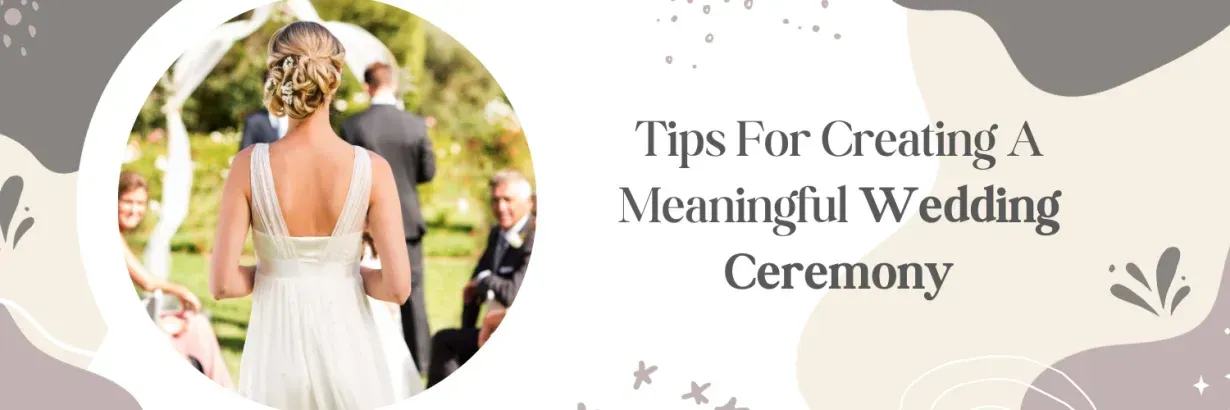
Tips For Creating A Meaningful Wedding Ceremony
The wedding ceremony is the heart of your special day. It’s the moment you and your partner make lifelong promises to each other, setting the tone for the entire celebration. A meaningful wedding ceremony goes beyond the traditional script – it’s a reflection of your unique love story. When done right, it can touch the hearts of your guests and leave a lasting impression.
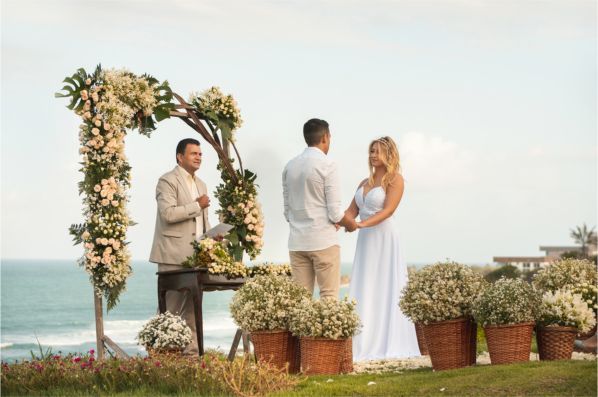
It’s the moment when you and your partner pledge your love and commitment to each other in front of your closest friends and family. Creating a meaningful wedding ceremony is not just about going through the motions; it’s about infusing your ceremony with love, emotion, and personal touches.
1. Reflect on Your Relationship
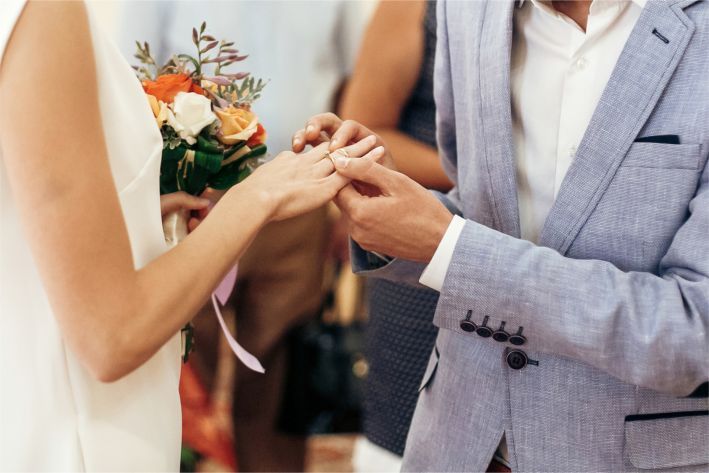
Before you dive into the intricate details of wedding planning, taking time to reflect on your relationship is a crucial step in ensuring that your wedding ceremony holds deep meaning and authenticity.
Here’s why this reflection is so significant:
Your wedding day is a celebration of your love: At its core, a wedding is a celebration of the love and commitment between you and your partner. Reflecting on your relationship reminds you of the love that brought you together in the first place, making the ceremony a genuine representation of your bond.
Understanding your unique love story: No two relationships are the same. Reflecting on your journey as a couple helps you understand what makes your love unique. It’s a reminder of the special moments, shared experiences, and challenges you’ve overcome together.
Setting the tone for a meaningful ceremony: Your ceremony is the centrepiece of your wedding day and should reflect the essence of your love story. By reflecting on your relationship, you gain clarity about the elements you want to incorporate into your ceremony to make it deeply personal and meaningful.
2. Choose the Right Officiant

The role of an officiant in your wedding ceremony is pivotal in ensuring that the event is not only legally binding but also deeply meaningful and reflective of your love story.
Here’s a deeper look at the significance of an officiant’s role:
- Guiding the Ceremony: The officiant serves as the guide throughout your ceremony. They lead the proceedings, ensuring everything flows smoothly and according to plan. This guidance helps create a sense of order and purpose in the ceremony.
- Reflecting Your Values and Beliefs: Your officiant is responsible for tailoring the ceremony to align with your values and beliefs. Whether you have religious, spiritual, or secular preferences, the officiant should be able to incorporate them into the ceremony, making it a genuine reflection of your partnership.
- Setting the Tone: The officiant sets the emotional tone of the ceremony. They can help create an atmosphere of love, joy, and solemnity, depending on your preferences. Their words and demeanour influence how you and your guests experience the ceremony.
- Conveying Your Love Story: A skilled officiant can effectively convey your love story to your guests. They should be able to narrate the journey of your relationship, emphasizing key moments and personal anecdotes that highlight your bond.
- Legal Responsibilities: Beyond the emotional and spiritual aspects, the officiant is responsible for ensuring that the ceremony complies with legal requirements. They’ll help you complete the necessary paperwork and ensure your marriage is legally binding.
3. Write Personal Vows
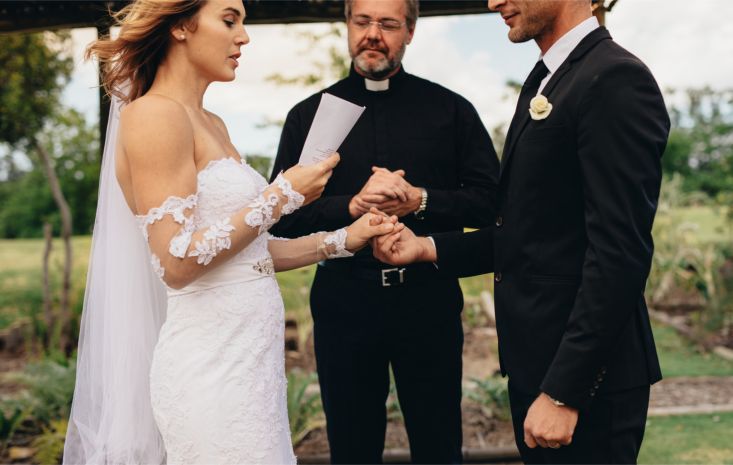
Personal vows are a cornerstone of creating a wedding ceremony filled with emotional depth and authenticity.
Here’s why they play such a crucial role:
- Heartfelt Expression: Personal vows allow you and your partner to express your feelings from the heart. This genuine expression of emotions creates an immediate and profound connection with both each other and your guests.
- Uniqueness: Personal vows make your ceremony uniquely yours. They differentiate your wedding from others and emphasize the individuality of your love story.
- Deeper Connection: As you share your personal vows, you connect with your partner on a deeper level. You take a moment to pause, reflect, and express the love, commitment, and promises that have brought you to this point.
- Engaging Guests: Personal vows also engage your guests emotionally. When your love story is narrated through personal vows, it draws your friends and family into the depth of your relationship, making them active participants in your special moment.
- Lasting Memories: The impact of personal vows lingers in your memories and the memories of your guests long after the ceremony is over. They become a cherished part of your wedding day.
4. Incorporate Symbolic Rituals
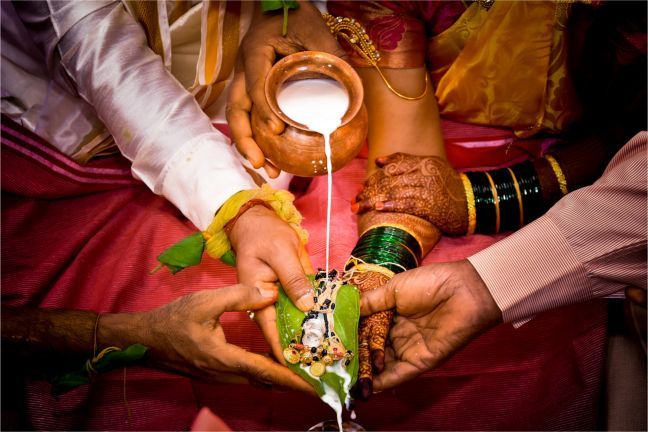
Symbolic rituals add depth and meaning to your ceremony. They can represent the merging of two lives, families, or cultures, and convey your commitment visually and emotionally.
Select rituals that hold personal meaning for you and your partner. Whether it’s lighting a unity candle, exchanging rings, or planting a tree, these rituals can make your ceremony uniquely yours.
Unity Candle Ceremony
Symbolizing the union of two lives, the couple lights a single candle together, merging their individual flames into one shared light.
Ring Exchange
A timeless tradition, the exchange of rings signifies the eternal commitment and love between partners, as the circular shape symbolizes unending devotion.
Tree Planting Ritual
Choosing a sapling and planting it together represents the growth of your relationship, with the tree serving as a living reminder of your shared journey and enduring love.
Sand Blending Ceremony
By pouring different colored sands into a single vessel, couples symbolize the blending of their separate lives into a harmonious and inseparable union.
Handfasting Ceremony
Originating from ancient traditions, this ritual involves tying the couple’s hands together with a symbolic knot, signifying their commitment to each other and the binding of their destinies.
Wine or Unity Cup Ceremony
Sharing a cup of wine underscores the idea of a shared life. Each partner takes a sip, symbolizing the blending of their individual selves into a unified partnership.
Love Letter Box
Couples write letters to each other, sealing them in a box with a bottle of wine. The box is to be opened on a future anniversary, allowing them to reflect on their journey and renew their commitment.
Jumping the Broom
This tradition, rooted in African American culture, symbolizes the sweeping away of the old and the welcoming of the new as the couple jumps over a broom together, marking the beginning of their shared life.
Butterfly Release
Releasing butterflies during the ceremony represents transformation and new beginnings, symbolizing the couple’s metamorphosis into a new chapter of their lives.
5. Personalise Your Music Selection
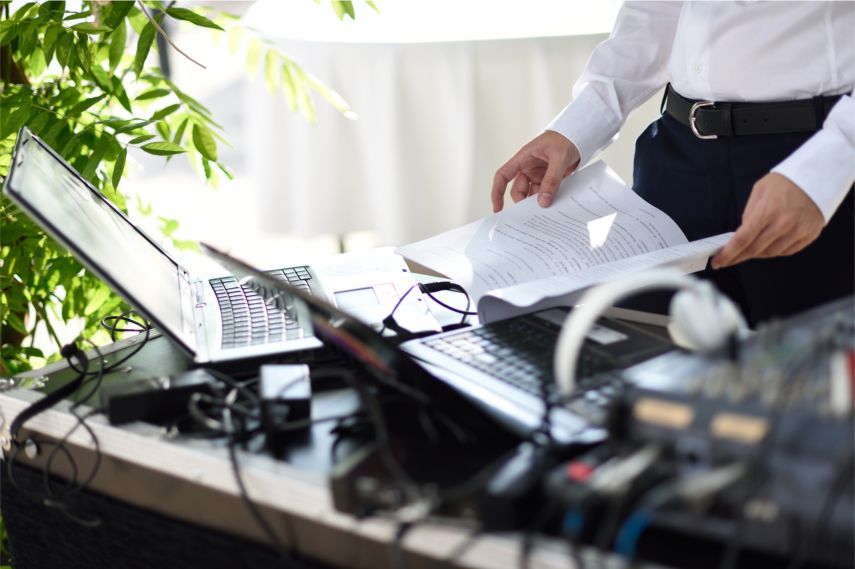
Music is a powerful element in your wedding ceremony, adding depth and emotion. Here’s how:
- Evoke Emotions: Music connects with emotions deeply. The melody, lyrics, and instrumentals set a heartfelt tone, making the ceremony more meaningful.
- Create Memorable Experiences: Thoughtful music choices create memorable moments for you and your guests. It transforms the ceremony into an emotional journey that lingers in everyone’s memory.
- Express Love: Music conveys emotions that words may struggle to express. It adds another layer of emotion to your love, commitment, and unique bond.
- Highlight Key Moments: Specific songs can highlight essential parts of your ceremony, like the entrance, vows, or exit. These songs become the soundtrack of your love story.
- Set the Atmosphere: Music sets the atmosphere you desire, be it solemn, romantic, or celebratory. It prepares guests emotionally, enhancing the ambience.
- Engage Your Guests: Music engages guests emotionally, making them active participants. When they feel the emotions through music, they connect more deeply with your love story.
Choosing Meaningful Songs
Select songs that hold special meaning to personalize your ceremony:
- Choose “your song,” one significant in your relationship’s history.
- Opt for songs with lyrics that resonate with your love story, whether romantic or uplifting.
- Pick songs from shared experiences, like vacations or adventures.
- Celebrate diversity by including music from both your cultural or heritage backgrounds.
- Include family-favourite songs for unity and nostalgia.
- Create a playlist representing your relationship’s stages, from the first engagement meeting.
- Personal Compositions: If musically inclined, compose a personalized song or instrumental piece.
6. Involve Loved Ones
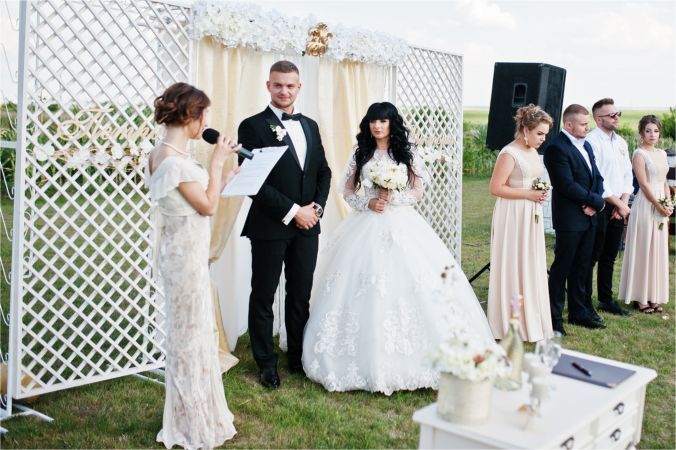
Incorporating your friends and family into your wedding ceremony holds great significance, as it fosters unity and support. Here’s why it matters:
- Unity and Support: Involving loved ones symbolizes the unity and support surrounding your relationship. It reinforces the idea that your journey is shared with those who care deeply about your happiness.
- Acknowledging Importance: It’s a way to acknowledge the vital roles your friends and family play in your lives. By inviting them to participate, you express gratitude and appreciation for their presence.
Ideas for Involving Loved Ones
There are numerous ways to include your loved ones in your ceremony:
- Readings: Invite friends or family members to share readings that hold personal meaning for you and your partner. These readings can be poems, passages from books, or even original compositions.
- Speeches: Ask loved ones to give speeches or toasts during the ceremony. Their words can be touching and memorable, adding a personal touch to the event.
- Symbolic Rituals: Consider involving friends and family in symbolic rituals like a unity candle lighting, sand ceremony, or ring warming. These rituals signify the coming together of two families or the sharing of your love with those close to you.
Making Guests Feel a Part of Your Journey
Your wedding ceremony is an opportunity to make your guests feel connected to your journey and your love story. Here’s why it’s important:
- Shared Celebration: Your wedding is not just a celebration of your love for each other; it’s a celebration of your love with everyone you’ve invited. It’s a chance to include your guests in your joyous moment.
- Guest Appreciation: Acknowledging your guests’ presence and involvement shows appreciation. It reinforces that their support is valued and that they’re an integral part of your life.
- Emotional Connection: When guests feel connected to your ceremony, they’re more emotionally engaged. This connection adds depth and meaning to the entire event.
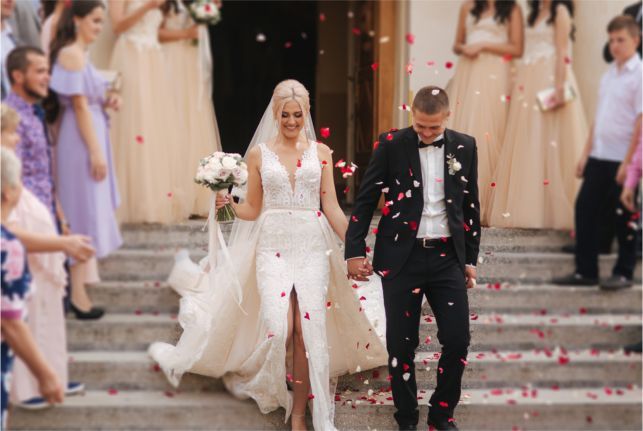
Make Your Big Day Truly Special with Tina Kristen Weddings
Creating a super meaningful wedding ceremony is like curating a playlist of your love story—each ritual is a hit song that makes your day a chart-topper! Now, let’s talk glam because, honey, you’ve got to shine on your big day!
Tina Kristen Weddings brings the glam game strong with their hair and makeup magic. So, as you plan these epic moments, know that Tina Kristen Weddings has your back (and your hair and makeup). Get ready to turn heads and drop jaws because you’re about to own that aisle like a queen! Contact us now.
FAQs
Q: How long should a wedding ceremony be?
The ideal length for a wedding ceremony is typically around 20-30 minutes. However, it can vary depending on your chosen elements, such as readings, rituals, and music. It’s essential to strike a balance between meaningful content and keeping your guests engaged.
Q: Can we incorporate cultural or religious elements?
Absolutely! Incorporating cultural or religious elements can add depth and significance to your ceremony. Consult with your officiant to ensure these elements align with your vision and beliefs.
Q: What if we have different faiths or backgrounds?
Different faiths or backgrounds can lead to a beautifully diverse and inclusive ceremony. Work with your officiant to find common ground and create a ceremony that respects and honours both of your traditions and beliefs. It can be a meaningful way to celebrate your unique love story.
